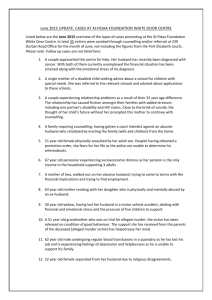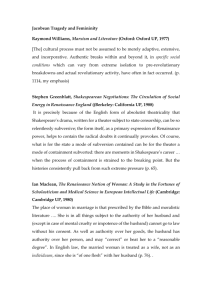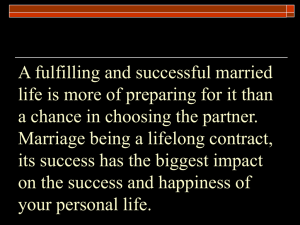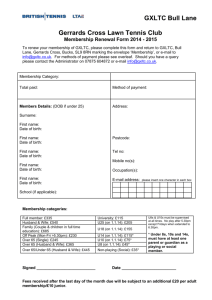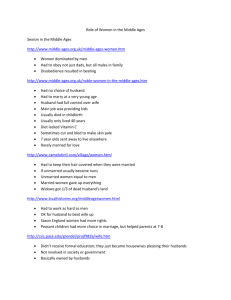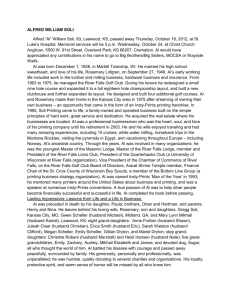Yevamoth 10-1
advertisement
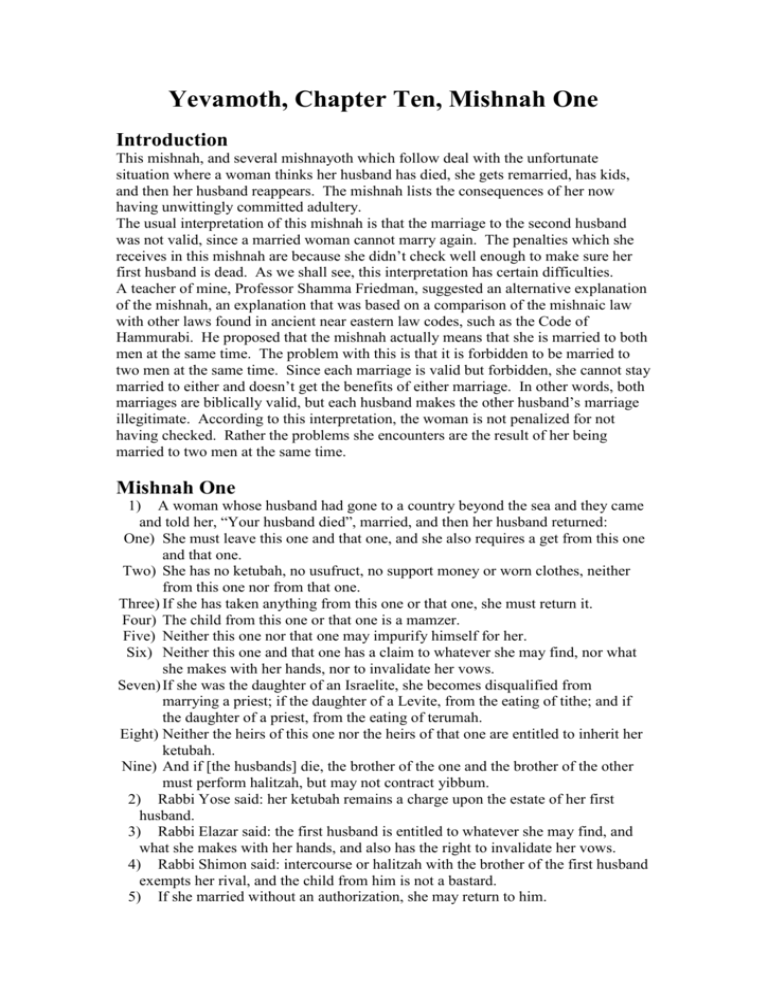
Yevamoth, Chapter Ten, Mishnah One Introduction This mishnah, and several mishnayoth which follow deal with the unfortunate situation where a woman thinks her husband has died, she gets remarried, has kids, and then her husband reappears. The mishnah lists the consequences of her now having unwittingly committed adultery. The usual interpretation of this mishnah is that the marriage to the second husband was not valid, since a married woman cannot marry again. The penalties which she receives in this mishnah are because she didn’t check well enough to make sure her first husband is dead. As we shall see, this interpretation has certain difficulties. A teacher of mine, Professor Shamma Friedman, suggested an alternative explanation of the mishnah, an explanation that was based on a comparison of the mishnaic law with other laws found in ancient near eastern law codes, such as the Code of Hammurabi. He proposed that the mishnah actually means that she is married to both men at the same time. The problem with this is that it is forbidden to be married to two men at the same time. Since each marriage is valid but forbidden, she cannot stay married to either and doesn’t get the benefits of either marriage. In other words, both marriages are biblically valid, but each husband makes the other husband’s marriage illegitimate. According to this interpretation, the woman is not penalized for not having checked. Rather the problems she encounters are the result of her being married to two men at the same time. Mishnah One 1) A woman whose husband had gone to a country beyond the sea and they came and told her, “Your husband died”, married, and then her husband returned: One) She must leave this one and that one, and she also requires a get from this one and that one. Two) She has no ketubah, no usufruct, no support money or worn clothes, neither from this one nor from that one. Three) If she has taken anything from this one or that one, she must return it. Four) The child from this one or that one is a mamzer. Five) Neither this one nor that one may impurify himself for her. Six) Neither this one and that one has a claim to whatever she may find, nor what she makes with her hands, nor to invalidate her vows. Seven) If she was the daughter of an Israelite, she becomes disqualified from marrying a priest; if the daughter of a Levite, from the eating of tithe; and if the daughter of a priest, from the eating of terumah. Eight) Neither the heirs of this one nor the heirs of that one are entitled to inherit her ketubah. Nine) And if [the husbands] die, the brother of the one and the brother of the other must perform halitzah, but may not contract yibbum. 2) Rabbi Yose said: her ketubah remains a charge upon the estate of her first husband. 3) Rabbi Elazar said: the first husband is entitled to whatever she may find, and what she makes with her hands, and also has the right to invalidate her vows. 4) Rabbi Shimon said: intercourse or halitzah with the brother of the first husband exempts her rival, and the child from him is not a bastard. 5) If she married without an authorization, she may return to him. Explanation Section one: This section lists all of the results of her having married another man while her first husband is still alive. I will go through each one by one: She must leave this one and that one, and she also requires a get from this one and that one: She must be divorced from each of them, for she is forbidden to each. She also needs a get from each of them. According to the talmudic interpretation, the get from the second husband is only of rabbinic origin, for according to biblical law, she is not married to the second man. She has no ketubah, no usufruct, no support money or worn clothes, neither from this one nor from that one: She does not receive any of the financial benefits that she would have accrued from her husband. This clause was explained above in 9:3. If she has taken anything from this one or that one, she must return it: If she had taken any of these things to which she is not entitled, she must return them. Some times, in cases of doubt, possession is enough for a person not to have to return something. However, in this case, her possession is considered truly illegal and she must return what she took. The child from this one or that one is a mamzer: The child from the second husband is a mamzer because she gave birth to him while married to the first husband. Should she return to the first husband, the subsequent child will also be a mamzer. Neither this one nor that one may impurify himself for her: A priest is allowed to impurify himself to bury his wife. In this case, if either husband is a priest and she dies, they may not impurify themselves for her. Neither this one and that one has a claim to whatever she may find, nor what she makes with her hands, nor to invalidate her vows: These are all rights given to a husband during marriage. Since the marriage is now invalid, he loses all these rights. Invalidating vows is discussed in Numbers 30. If she was the daughter of an Israelite, she becomes disqualified from marrying a priest; if the daughter of a Levite, from the eating of tithe; and if the daughter of a priest, from the eating of terumah: The illicit marriage to the second husband disqualifies her from all rights that might be accrued from either kohanic or levitical status. The result is that she could no longer marry a priest nor eat tithe if her father was a Levite, nor eat terumah if her father was a priest. Neither the heirs of this one nor the heirs of that one are entitled to inherit her ketubah: According to a ketubah clause which we will see in chapter four of tractate Ketuboth, a woman’s male children inherit her ketubah. However, in this case they too are penalized and lose their inheritance. And if [the husbands] die, the brother of the one and the brother of the other must perform halitzah, but may not contract yibbum: Since both marriages were invalid, the brothers cannot perform yibbum. Note that according to the talmudic interpretation, the halitzah of the brother of the second husband is only of rabbinic origin, since according to Torah law the second marriage was not valid. Section two: The mishnah now brings up opinions that do not agree with the long list seen in section. Rabbi Yose holds that she does receive her ketubah from her first husband, since she only committed adultery unintentionally. Section three: Rabbi Elazar adds that the first husband continues to receive the economic benefits from his wife. Section four: Rabbi Shimon holds that the brother of the first husband may have yibbum with her, and that by performing yibbum or halitzah, the rival wife is exempted from yibbum or halitzah. Assumedly he also holds that she does not need halitzah from the second husband’s brother. Finally, should she go back to her first husband, the child from such a relationship is not a mamzer. Section five: This section really belongs to the following mishnah. It teaches that if she married without the permission of the court, she is allowed to return to her first husband, because in this case the second marriage was totally accidental. However, if she married with the permission of the court, the second marriage is valid and all of the above listed results occur.

